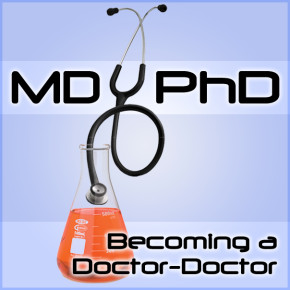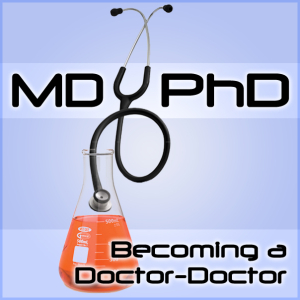 It’s hard to say what motivates my fellow MD/PhD trainees to pursue the physician-scientist career track. In some ways, we’re a masochistic group, voluntarily choosing to spend seven to 10 years in the prime of our lives completing two doctoral degrees instead of one, then spending another four to eight years or more in residency, research residency, postdoctoral and possibly fellowship training before seeking a “real” job. Even for those of us who started our journey toward the MD/PhD degrees at a young age (I began at 22), we’ll be flirting with 40 years of age by the time our training is over.
It’s hard to say what motivates my fellow MD/PhD trainees to pursue the physician-scientist career track. In some ways, we’re a masochistic group, voluntarily choosing to spend seven to 10 years in the prime of our lives completing two doctoral degrees instead of one, then spending another four to eight years or more in residency, research residency, postdoctoral and possibly fellowship training before seeking a “real” job. Even for those of us who started our journey toward the MD/PhD degrees at a young age (I began at 22), we’ll be flirting with 40 years of age by the time our training is over.
While I can’t speak for my colleagues, I’ll briefly chronicle what drove me to choose the MD/PhD track. I have had a strong interest in science and the natural world from a very early age. I was the kid who would come home from school and pore over astronomy books, atlases and encyclopedias (in those pre-Wikipedia days of yore). Growing up on the northwest side of Chicago, I would beg my parents on a near-weekly basis to take me to the Field Museum, the Museum of Science and Industry, and the Adler Planetarium downtown.
My interest in science grew into a passion through elementary school science fairs and high school biology and chemistry lab experiments. When I matriculated to Rice University in Houston, TX in August 2005, I knew I wanted to focus my studies on the natural sciences. Midway through my first year, I decided to major in biochemistry and cell biology, as well as complete a dual degree in English; this last pursuit was to strengthen my ability to read critically and write in different styles for diverse audiences. I quickly became involved in undergraduate research, which I pursued all four years at Rice. The logical next step would have been to go to graduate school to earn a PhD, en route to becoming a research scientist.
However, I was perhaps too influenced by my environment.Rice has a strong track record of attracting premed students; in fact, I joked with my friends about how 75% of Rice’s incoming freshmen are premed, and how 50% of Rice’s graduating class go on to medical school. My social circle largely consisted of science classmates—most of whom were premed—and so I too contemplated becoming premed. After all, I had seen a fair number of physicians in my life (from pediatricians and general practitioners for annual checkups, to surgeons when I underwent a few operations as a child, to dermatologists to treat my acne-ridden face), and they all seemed like cool people who enjoyed their work and made positive impacts in the lives of others. And, being the intellectual nerd that I am, there were definitely enough complex problems in medicine to stimulate me. However, I definitely wanted to pursue a career in research, and I didn’t think pursuing both a medical and research career was a tangible option. However, as I explored my options, I found out about combined MD/PhD degree programs, and I met some MD/PhD trainees and graduates through some networking events.
Several experiences I had as a Rice upperclasswoman crystallized my desire to pursue the MD/PhD track. I had the opportunity to be a teaching assistant for half a dozen classes my junior and senior years (thanks to Rice’s rather small graduate student population in comparison to undergraduate population), including the oft-dreaded organic chemistry course. I found that I really enjoyed teaching, especially when I was able to help students work through and understand difficult concepts and problems. I realized that a career in medicine would provide me an abundance of opportunities to interact meaningfully with patients, colleagues and the general public, perhaps more so than a career as a bench scientist. Still, I loved doing research and delving deeply into scientific problems, and I wanted more time and training to grow and learn as an independent scientist. So, as a college senior, I applied exclusively to MD/PhD programs. I ultimately chose to enter the Medical Scholars Program (MSP) at the University of Illinois at Urbana-Champaign (UIUC) because of the MSP’s strong commitment to research and the abundance of opportunities on the Urbana-Champaign campus. One major difference between the UIUC MSP and conventional medical scientist training programs (MSTPs) is that we start the program as full-time PhD students, take first-year medical classes at our own pace while concurrently pursuing doctoral work, and then finish by completing the last three years of medical school.
I’m now starting my fifth year in the MSP and will soon finish my doctoral studies and transition to being a full-time medical student. I’ll be writing more about my journey in upcoming columns. While I will readily admit that the training process is lengthy and challenging, and that we’ll all likely be “old” (or substantially older) when we finish, most of us do enjoy the journey and make time for life to happen in the process.
MD/PhD: Becoming a Doctor-Doctor
This column explores the MD/PhD career track from a current trainee’s perspective, including the benefits and challenges of pursuing two doctoral degrees simultaneously, time management and life balance, and post-graduation training and career opportunities.

